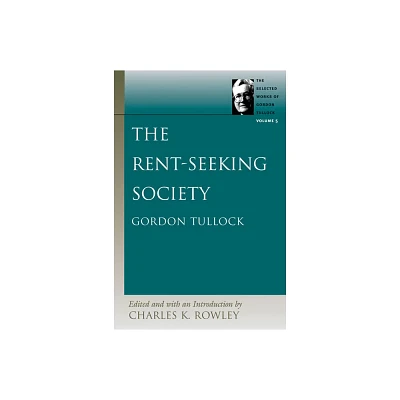Home
The Rent-Seeking Society
Loading Inventory...
Barnes and Noble
The Rent-Seeking Society
Current price: $24.00


Barnes and Noble
The Rent-Seeking Society
Current price: $24.00
Loading Inventory...
Size: OS
*Product Information may vary - to confirm product availability, pricing, and additional information please contact Barnes and Noble
The fifth volume in
The Selected Works of Gordon Tullock
consists of six parts, each part expounding on a separate component of the field. Part 1, “Rent Seeking: An Overview,” brings together two papers that focus on problems of defining rent-seeking behavior and outline the nature of the ongoing research program in a historical perspective. Part 2, “More on Efficient Rent Seeking,” contains four contributions in which Tullock elaborates on his 1980 article on efficient rent seeking. Part 3, “The Environments of Rent Seeking,” consists of eight papers that collectively display the breadth of the rent-seeking concept. Part 4, “The Cost of Rent Seeking,” comprises seven papers that address several important issues about the cost of rent seeking to society as a whole. Part 5 is Tullock’s short monograph
Exchanges and Contracts
, in which he develops a systematic theory of exchange in political markets. In Part 6, “Future Directions for Rent-Seeking Research,” Tullock focuses on the importance of information in the political marketplace.
This work has been carefully constructed to build on the inaugural volume in this collection and to ease students through the field in a clear and concise manner.
Gordon Tullock is Professor Emeritus of Law at George Mason University, where he was Distinguished Research Fellow in the Center for Study of Public Choice and UniversityProfessor of Law and Economics. He also taught at the Universityof South Carolina, the Universityof Virginia, Rice University, Virginia Polytechnic Institute and State University, and the Universityof Arizona. In 1966 he founded the journal that became Public Choice and remained its editor until 1990.
Charles K. Rowley was Duncan Black Professor of Economics at George Mason Universityand a Senior Fellow of the James M. Buchanan Center for Political Economy at George Mason University. He was also General Director of the Locke Institute.
The Selected Works of Gordon Tullock
consists of six parts, each part expounding on a separate component of the field. Part 1, “Rent Seeking: An Overview,” brings together two papers that focus on problems of defining rent-seeking behavior and outline the nature of the ongoing research program in a historical perspective. Part 2, “More on Efficient Rent Seeking,” contains four contributions in which Tullock elaborates on his 1980 article on efficient rent seeking. Part 3, “The Environments of Rent Seeking,” consists of eight papers that collectively display the breadth of the rent-seeking concept. Part 4, “The Cost of Rent Seeking,” comprises seven papers that address several important issues about the cost of rent seeking to society as a whole. Part 5 is Tullock’s short monograph
Exchanges and Contracts
, in which he develops a systematic theory of exchange in political markets. In Part 6, “Future Directions for Rent-Seeking Research,” Tullock focuses on the importance of information in the political marketplace.
This work has been carefully constructed to build on the inaugural volume in this collection and to ease students through the field in a clear and concise manner.
Gordon Tullock is Professor Emeritus of Law at George Mason University, where he was Distinguished Research Fellow in the Center for Study of Public Choice and UniversityProfessor of Law and Economics. He also taught at the Universityof South Carolina, the Universityof Virginia, Rice University, Virginia Polytechnic Institute and State University, and the Universityof Arizona. In 1966 he founded the journal that became Public Choice and remained its editor until 1990.
Charles K. Rowley was Duncan Black Professor of Economics at George Mason Universityand a Senior Fellow of the James M. Buchanan Center for Political Economy at George Mason University. He was also General Director of the Locke Institute.


















